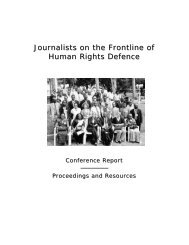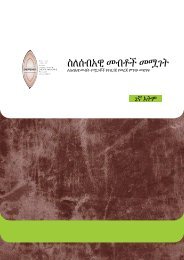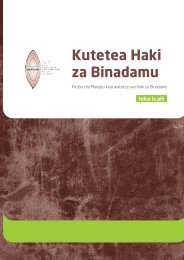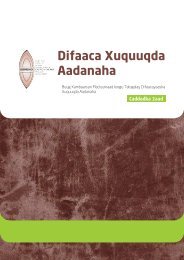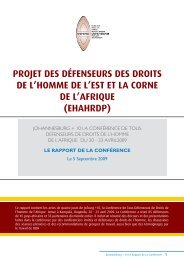Table of Contents - East and Horn of Africa Human Rights ...
Table of Contents - East and Horn of Africa Human Rights ...
Table of Contents - East and Horn of Africa Human Rights ...
You also want an ePaper? Increase the reach of your titles
YUMPU automatically turns print PDFs into web optimized ePapers that Google loves.
Regional Workshop on Women <strong>and</strong> Minority <strong>Human</strong> <strong>Rights</strong> Defenders<br />
SIHA on the other h<strong>and</strong> is a membership organization <strong>of</strong> indigenous women’s rights<br />
organizations. It addresses aspects affecting women in Sudan such as the existing ‘Public Order<br />
Code’ that oppresses women by requiring them to wear Islamic dress. The Code is enforced<br />
through a special police force – the Public Order Force.<br />
Through her discussion, Ms Hala illustrated some <strong>of</strong> the challenges faced by women human<br />
rights defenders in Sudan such as the divisions amongst women rights organizations, the<br />
compartmentalization <strong>of</strong> human rights, repressive legal regimes, direct threats <strong>and</strong> the lack <strong>of</strong><br />
adequate response mechanisms.<br />
Arising from the above experiences, it is clear that women human rights defenders put<br />
themselves on the front line in the promotion <strong>and</strong> protection <strong>of</strong> human rights. In doing so, they<br />
face risks that are specific to their gender <strong>and</strong> additional to those faced by men. Harassment <strong>and</strong><br />
attacks against them may themselves take gender- specific forms ranging from verbal abuse<br />
directed exclusively at women because <strong>of</strong> their gender. These human rights abuses can, in turn,<br />
have repercussions that are, in <strong>and</strong> <strong>of</strong> themselves, gender-specific such as pregnancies resulting<br />
out <strong>of</strong> rape.<br />
From the discussion that followed, Agreed Common Grounds from this session were that:<br />
� Women’s human rights are the easiest to violate <strong>and</strong> get away with because <strong>of</strong> the layers<br />
created by culture <strong>and</strong> tradition that support these violations.<br />
� Many women are ‘role filling’ - many <strong>of</strong> them are in positions <strong>of</strong> power but are not<br />
empowered to act. Further, many women go out <strong>of</strong> their way to take up responsibilities<br />
that are not acknowledged, recognized, or even<br />
documented.<br />
� Very few people underst<strong>and</strong> what women human rights<br />
defenders really are or the role that they play.<br />
Nevertheless, these should be recognized <strong>and</strong> affirmed as<br />
equal partners <strong>and</strong> leaders.<br />
� Women’s human rights should not be compartmentalized<br />
as ‘women issues only’ but should be addressed within<br />
the mainstream human rights discourse.<br />
� Strategies should be sought on how to protect all women<br />
human rights defenders in new <strong>and</strong> creative ways <strong>and</strong><br />
using on agreed regional <strong>and</strong> international human rights<br />
F. Minority Defenders in the <strong>East</strong> <strong>and</strong> <strong>Horn</strong> <strong>of</strong> <strong>Africa</strong>; An Overview <strong>of</strong> Work<br />
Experiences<br />
11 | P a g e<br />
Ms Hala El Karib.



